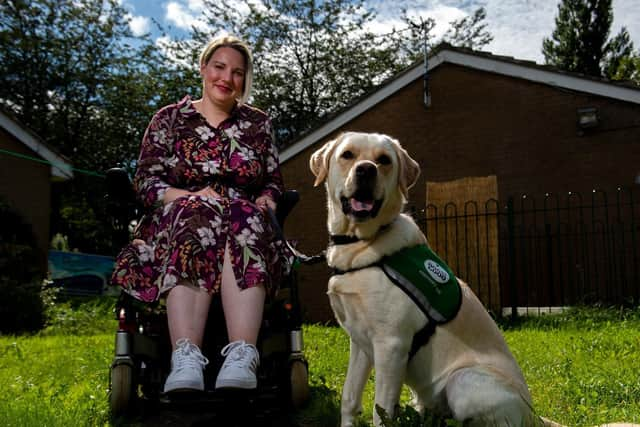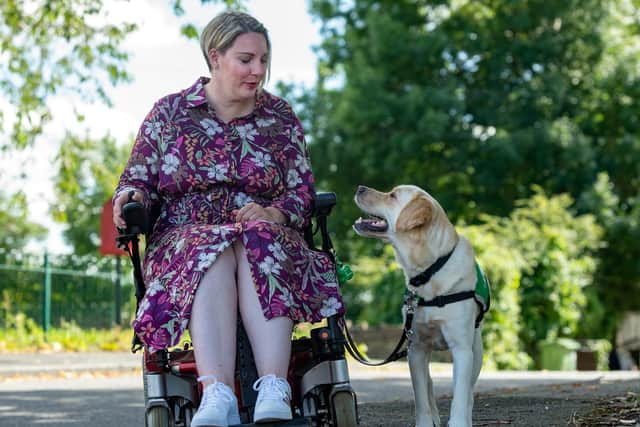'How help of my new assistance dog Udo has changed life for the better'
It took 30 years for Toni-Jane Bromley to be diagnosed with a rare genetic condition that causes her to struggle with joint dislocation and fatigue.
She first began showing symptoms as a toddler, but it was only aged 32 that doctors told her she had a hypermobile type of Ehlers-Danlos syndrome (EDS), the name given to a group of inherited conditions that affect connective tissue in the body.
Advertisement
Hide AdAdvertisement
Hide Ad“I have to be really careful not to do too much,” she says. “With my condition, for every movement I make, I use 50 per cent more energy than a healthy person would. Really by lunchtime, my body feels like it has done a full day when it hasn’t.


“I have to be really careful to pace myself, I do sometimes have to have daytime naps and I have to really think before I make a movement, like picking something up. I have to think about how I’m going to do it to make sure I don’t dislocate something.”
Earlier this year, Toni-Jane, who lives in Liversedge, successfully applied to the Dogs for Good charity in search of help to better manage her condition day-to-day. Four weeks before the lockdown began, Udo, a now two-year-old yellow labrador, moved into her home.
“I follow a lot of people on Instagram, either with my condition or similar conditions and a couple of them had assistance dogs,” the 35-year-old explains. “I started looking into it because I saw that they found it really helpful.”


Advertisement
Hide AdAdvertisement
Hide AdUdo picks things up for Toni-Jane if she drops them, empties the washing machine, brings her the post and is currently learning to help her strip the bed. “It’s mainly meaning that I can save energy by not having to do those tasks myself,” Toni-Jane says. “All those bits of energy that I save mean that I actually have time to spend on things I want to do.”
In October, Toni-Jane is planning to start a Master’s degree in education through the Open University - and it is something she says she would not have been able to achieve without Udo’s assistance. “I just wouldn’t have enough energy left over from doing day-to-day tasks to be able to sit and do something like that. He means that I can.”
Toni-Jane previously taught for five years, in both primary and secondary schools. She left in 2016, struggling to manage the symptoms she was experiencing and having not yet been diagnosed with EDS.
“It was almost impossible,” she says. “I thought I wasn’t able to keep up with the job. But now I know actually I just didn’t have enough time to pace myself and spread tasks out. Now I know in the future, I could potentially go back part time and be able to manage fine.
Advertisement
Hide AdAdvertisement
Hide Ad“Previously, I was exhausted constantly, going to sleep as soon as I came home and just didn’t really have time for anything else - things like marking weren’t getting done. I was really upset because it takes a long time to train to be a teacher and I love working with children.”
After that Toni-Jane moved to an office job, but she was still struggling to do a full week without feeling utterly exhausted. Her diagnosis finally came whilst she was having physiotherapy on her back, after being in a car accident.
“I was being seen by a physio for that and it was the physio that asked me a few questions - did I have digestion problems as well, did I suffer with fatigue? And they said it sounded a lot like I had Ehlers-Danlos Syndrome and needed to see a rheumatologist.
“That was then when I got diagnosed. I was happy in a way because all of a sudden my entire life made sense. But at the same time, I was really upset and frustrated that it had taken so long for somebody to be able to put the pieces together and tell me what was wrong with me.”
Advertisement
Hide AdAdvertisement
Hide AdAs a child Toni-Jane would frequently attend hospital with injuries. “I would be told it looks like it’s just a sprain but it always felt a lot more painful than that. Now we know that I was probably dislocating my joints and popping them back in. That would happen several times a week.”
When she reached the age of 16, the extreme tiredness also began to hit and Toni-Jane was then told she had ME, also known as Chronic Fatigue Syndrome. “I never really felt like that was quite right but there wasn’t a lot I could do,” she says.
Throughout her adulthood, she has suffered with joint issues and has had surgeries to fix dislocations in her ankle, hand and jaw. She has problems with her digestion and heart and uses a wheelchair to get around.
Her diagnosis has meant she has learned more about her condition and how best to manage it and she has now also been able to see specialists across the country for different parts of her body.
Advertisement
Hide AdAdvertisement
Hide Ad“I’ve had to take some time to really learn to manage my condition and also to see all my specialists. I’ve been under seven different hospitals for the last two years because for each issue with my condition, I have to see a different specialist. There’s not one specialist that looks after my whole condition.”
Toni-Jane says getting Udo has improved her life and having an extended period of time at home together during lockdown has helped the pair to bond. “It’s made a massive difference,” she says. “Those four weeks before lockdown, I was really struggling to get him to listen when I was giving him instructions and he was very easily distracted.
“Because of the lockdown, we’ve had so much time to bond and it’s just been me and him, and he’s now looking at me constantly for the next instruction and is a lot more settled and a lot more confident.”
“I have so much more energy now and he’s great company,” she adds. “He lifts my spirits every day which has been particularly important through lockdown. He’s totally transformed my life.”
Advertisement
Hide AdAdvertisement
Hide AdDogs for Good Instructor, Katie Anakin worked with Toni-Jane and Udo when they were first matched. She said: “Udo is quite a sensitive lad . He seems to have really thrived during lockdown because they’ve had so much bonding time. He’s such a smart dog and loves helping Toni-Jane.”
Dogs for Good provides highly-trained assistance dogs to people with physical disabilities and families who have a child with autism. The charity also supports people with learning disabilities and dementia to help them lead a more independent life through the help of a trained dog.
Visit www.dogsforgood.org for more information.
Support The Yorkshire Post and become a subscriber today.
Your subscription will help us to continue to bring quality news to the people of Yorkshire. In return, you'll see fewer ads on site, get free access to our app and receive exclusive members-only offers.
So, please - if you can - pay for our work. Just £5 per month is the starting point. If you think that which we are trying to achieve is worth more, you can pay us what you think we are worth. By doing so, you will be investing in something that is becoming increasingly rare. Independent journalism that cares less about right and left and more about right and wrong. Journalism you can trust.
Thank you
James Mitchinson